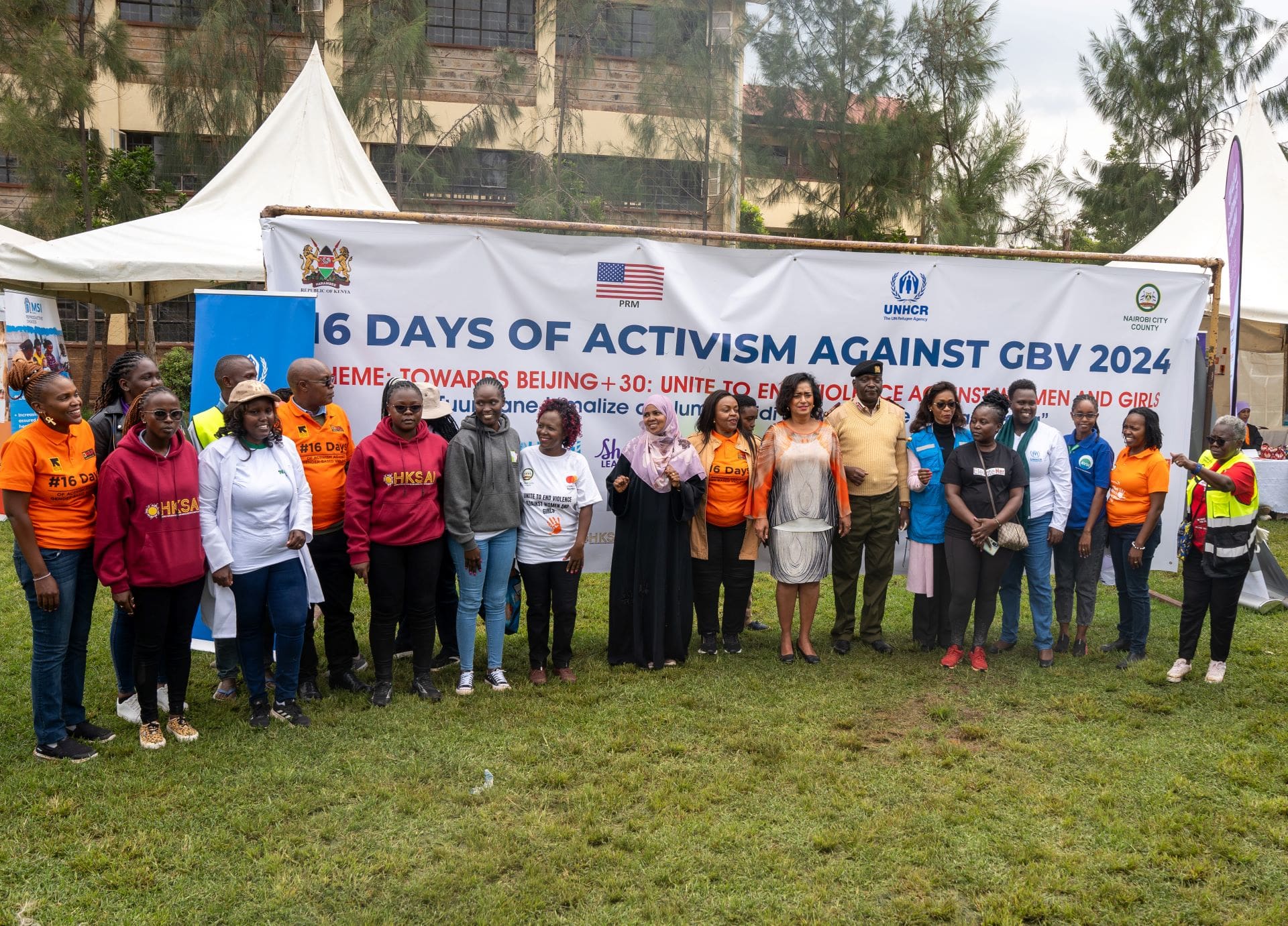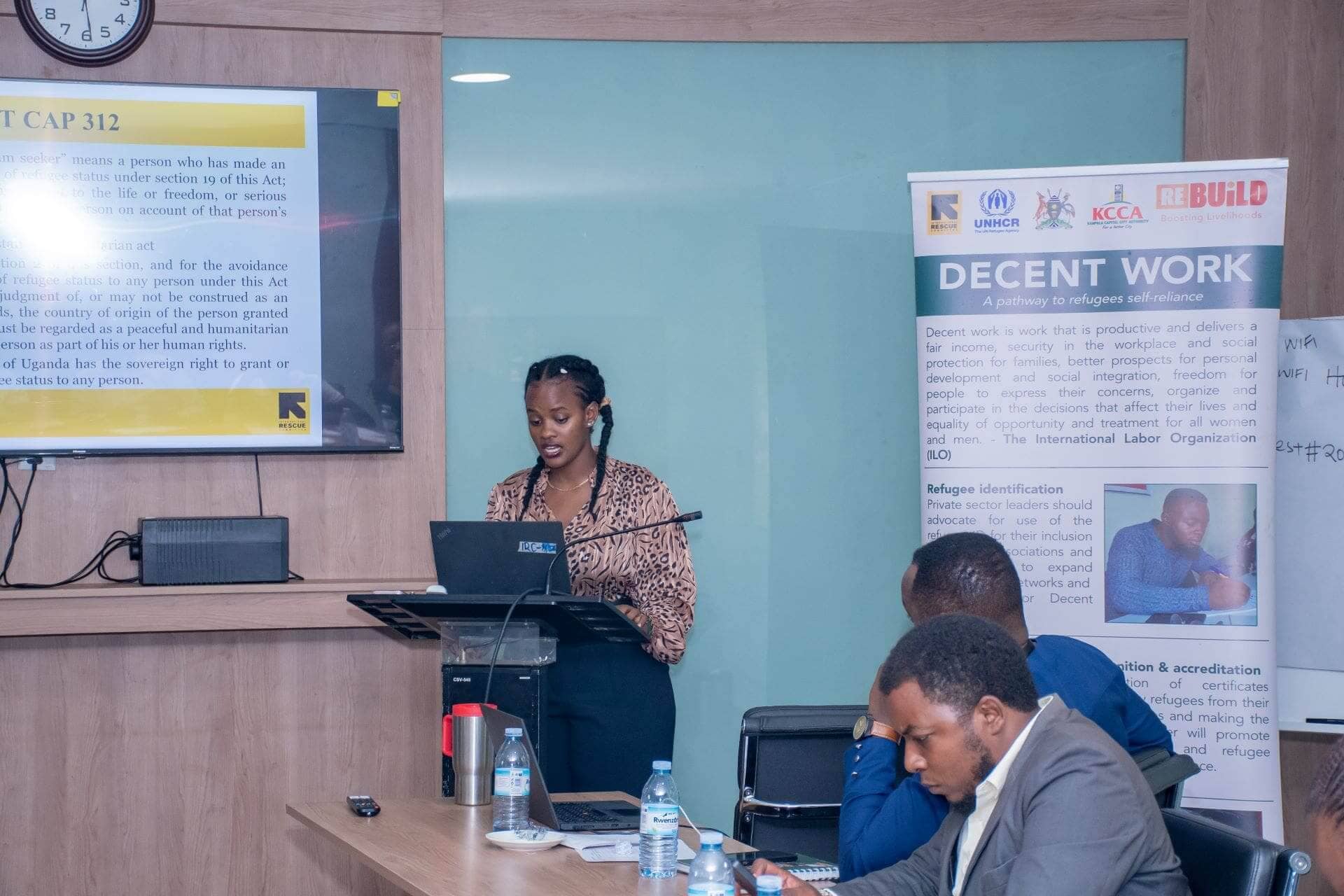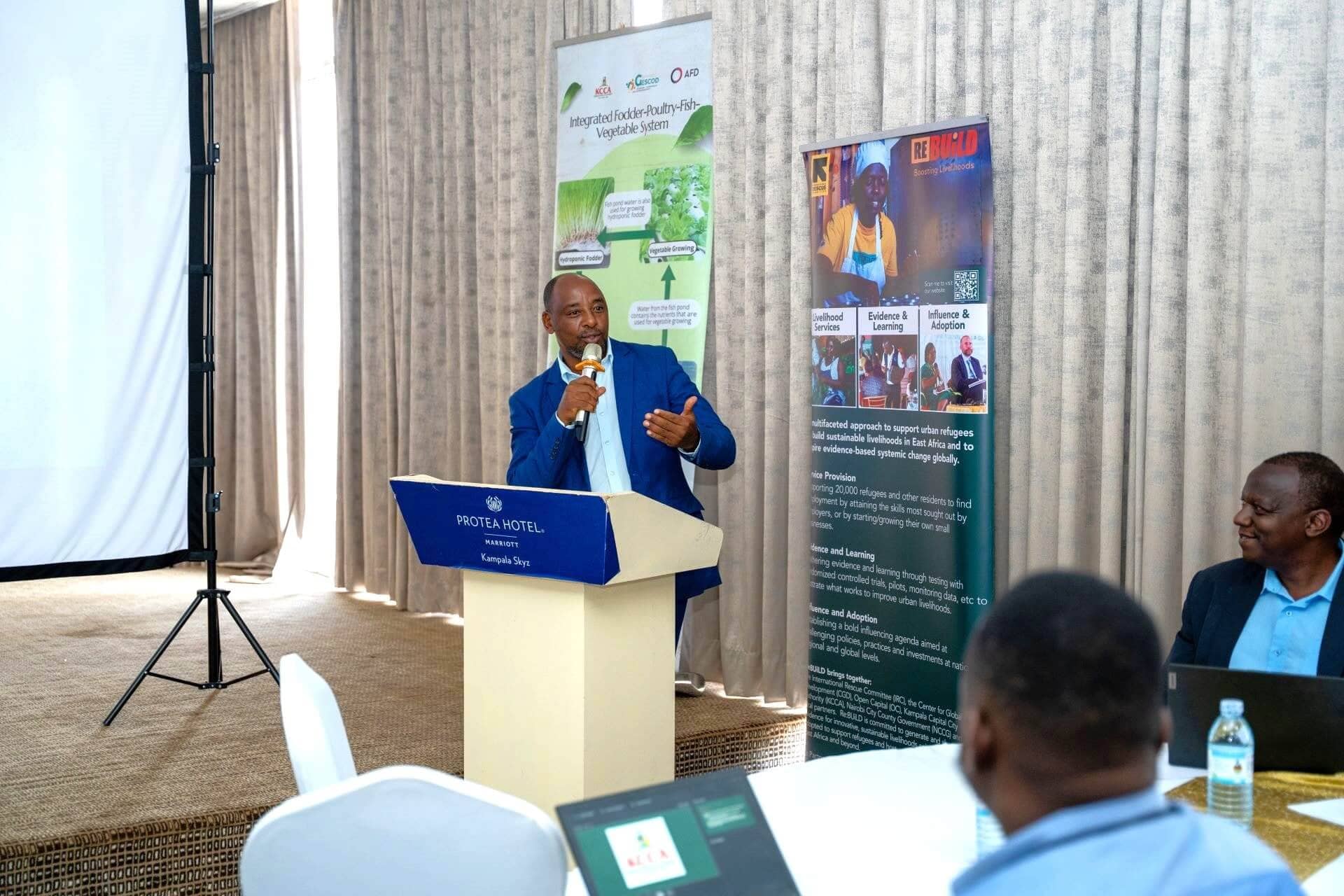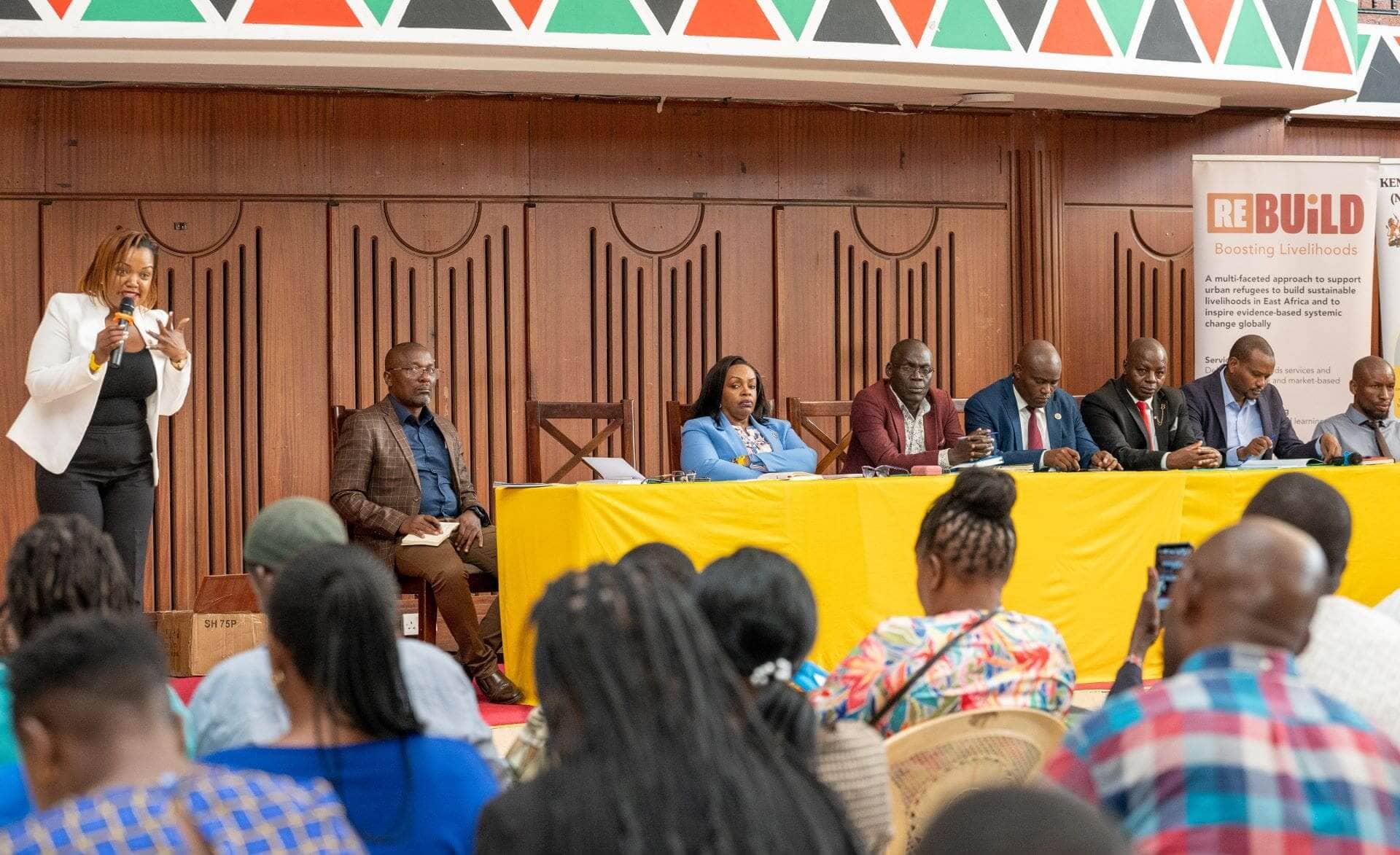Establishing a bold influencing agenda aimed at changing policies, practices, and investments at national, regional, and global levels by encouraging adoption of program evidence and learning.



Our aim is to ensure that Re:BUiLD’s scope of change extends across Kampala and Nairobi, and beyond to any city hosting refugees. The specific outcomes for our Influence and Adoption pillar are focused on two levels:
- Enabling policy change through national, regional and global policy makers.
- Sector change within the humanitarian and development community, who in turn must engage local private sector stakeholders.
- Using our evidence and learnings, we promote the value and effectiveness of urban refugee livelihoods programming.
Campaigns
Campaigns are tools employed by Re:BUiLD to influence policy and practice at a global, regional, national and community level. In 2022, Re:BUiLD conducted a campaign on the cost-of-living crisis for urban communities in Kampala and Nairobi which climaxed with the launch of a policy brief in October of the same year. The brief was launched during the Intergovernmental Authority on Development (IGAD) conference on the Kampala Declaration held in Nairobi. The brief called on donors and host governments to provide humanitarian assistance and national social protection on the basis of a human right without discrimination based on refugee status and location. Globally, the Re:BUiLD brief was presented at the UNHCR’s dialogue on protection challenges in Geneva.
In 2023, Re:BUiLD conducted a six-month long campaign on ‘Decent Work’ to promote refugees’ access to decent work in Nairobi and Kampala. The campaign aims to ensure that employers, governments, the private sector , humanitarian, and development actors understand the regulatory framework governing the type of employment that refugees can access and adopt strategies and practices that address barriers to refugee access to the formal and decent work.
On 15th and 16th October 2024, Re:BUiLD held a Policy and Research Symposium in Nairobi, which was a result of the collaborative effort between the Re:BUiLD program, the IKEA Foundation, and the World Bank, in collaboration with other partners. The Symposium sought to challenge traditional paradigms, foster innovative approaches to confront the complex issues surrounding forced displacement in the region and offered a networking opportunity for practitioners, refugees, donors, academia, private sector, policy makers and researchers from Kenya, Uganda and Ethiopia, with focus on four key themes: Access to Finance and Micro-enterprises; Access to Jobs and Skills Development; Access to Justice and Legal Identity; and Access to Social Protection. Presentations of research papers were done to set the tone for evidence-driven dialogue combined with insights from those with lived experiences in forced displacement, to inform policy making. You can find the full recordings of the sessions here, the post-event report here, and the blog on the Policy and Research Symposium Roadmap
We have officially begun the campaign titled "Revolutionizing Refugee Rights: Access to Documentation Campaign in Kenya and Uganda" for the year 2025. Currently, we are in the process of finalizing the reviews of the Concept Note and we intend to begin the formation of the Advisory/Planning Committee. We are also looking to onboard partners who are aligned with our mission and goals for this campaign.
National-Level Engagements Internationally
IRC’s 2025 Emergency Watchlist held in January 2025
Re:BUiLD participated in the International Rescue Committee (IRC) roundtable panel discussion on January 23. We discussed the IRC’s 2025 Emergency Watchlist, a list of the 20 countries globally at greatest risk of experiencing a significant deterioration in the humanitarian situation over the year ahead.
World Urban Forum held in November 2024
The Twelfth Session of the World Urban Forum (WUF12), held in Cairo, Egypt, from November 4 to 8, provided a critical platform for discussing sustainable urbanization and the challenges urban communities face worldwide. WUF12 offered significant insights and potential pathways to East African cities on improving living conditions and integrating urban displacement communities into urban governance by providing key lessons from across the globe on displacement inclusion. The IRC's Re:BUiLD program also hosted a side event during the WUF12 that brought together policymakers, practitioners, refugees, researchers, and donors to discuss the unique challenges urban-based refugees face and explore how various actors can better support them.
Africa Urban Forum held in September 2024
The Africa Urban Forum (AUF) 2024 , held in Adis Ababa, Ethiopia, from September 4 to 6, explored the critical role of urbanization in achieving the objectives of Agenda 2063 and shaping the future of Africa’s cities structured around two sub-themes: financing urbanization for socioeconomic transformation; and sustainable and resilient urban development in Africa. Experts from various fields, including governments, academia, urban planners, economists, architects, developers, community leaders, residents, civil society, the private sector, development agencies, and practitioners shared best practices related to urban development and planning commitment to action.
Global Refugee Forum held in December 2023
The Global Refugee Forum 2023, held in Geneva, Switzerland, from December 13 to 15, aimed at realizing the goals of the Global Compact on Refugees. Key outcomes included 1,600 pledges, totaling $2.2 billion in new financial commitments including approximately USD250million from the private sector. The focus of these pledges was on easing host country pressures, enhancing refugee self-reliance, and improving conditions in countries of origin. This marked a significant step forward with substantial commitments and actions aimed at addressing the challenges faced by refugees globally. The lessons learned and actions proposed provide a roadmap for Re: BUiLD to contribute to positive change in the refugee space. It also provided the basis of collaborations, support, and networking.
National-Level Engagements in Uganda
As Re:BUiLD continues its mission to enhance economic self-reliance for urban refugees and vulnerable host communities, our national-level engagements in Uganda are carefully crafted to drive systemic change, resonating with the goals of creating a bold influencing agenda. Each initiative is a strategic effort to influence policy, strengthen local systems, and foster inclusive practices.
Strengthening Refugee Economic Inclusion Through Strategic Partnerships: Re:BUiLD and KACITA Engagement
On February 6, 2025, Re:BUiLD, in collaboration with community advocacy partner PLAVU, initiated a critical dialogue with Kampala City Traders Association (KACITA) to explore opportunities for inclusive economic engagement. The engagement aimed to dispel myths surrounding urban refugees, particularly the perception that they are displacing locals in business spaces, and to promote shared economic opportunities within the city.
Following this dialogue, KACITA requested a capacity-building to better understand Uganda’s refugee legal frameworks. This request materialized on February 6, 2025, when Re:BUiLD, supported by the Office of the Prime Minister (OPM), facilitated a training workshop for KACITA’s board members and sector leaders.
Fostering Inclusion and Social Cohesion through Commemorations in 2025
In 2025, Re:BUiLD took part in the commemoration of key international days, notably International Women’s Day and World Disability Day, as part of our ongoing commitment to promoting social cohesion and refugee inclusion in urban spaces. These commemorations were not just moments of celebration but strategic platforms for advocacy, awareness-raising, and community engagement.
Through collaborative events involving both refugees and host community members, Re:BUiLD fostered shared understanding, respect, and collective action. A significant highlight of these events was the leadership role played by the Kampala Capital City Authority (KCCA). KCCA championed the message of inclusion by integrating refugee perspectives into the city’s social events and urban planning conversations.
Launch of the Refugee Reference Handbook in October, 2023
The launch of the Refugee Reference Handbook represents a significant step in equipping policymakers, employers, and service providers with essential knowledge to better support urban refugees. The handbook on refugee access to justice in Uganda, collaboratively developed by the Judiciary, the Office of the Prime Minister, IRC's Re:BUiLD Program, and refugee representatives, serves as a vital advocacy tool to influence legal practices and enhance justice for refugees. It provides practical guidance to navigate the complex legal system, aiming to empower refugees and reshape policies to better protect their rights. This handbook is designed to shape national policies and practices, promoting inclusivity in labor markets and service provision.
Introduction of Urban Refugee Employer Category at the Employer of the Year Awards held 1st March 2024
In partnership with the Federation of Uganda Employers, Re:BUiLD supported the Employer of the Year Awards by introducing a new category for Urban Refugee Employer of the Year, strategically aimed at advocating for and promoting the employment of refugees in urban areas. This initiative serves as a key influencing activity to encourage private sector engagement and drive inclusive hiring practices that support refugee livelihoods. During the event, the Human Resources Director, representing the country director, delivered remarks highlighting the significant opportunities that refugees present for all industrious sectors, emphasizing their potential to contribute meaningfully to the workforce. Spotlighting these employers, Re:BUiLD is driving a sector-wide shift towards inclusive employment practices, which are critical for the economic integration of refugees, reinforcing our commitment to fostering responsive and inclusive labor markets.
Commemoration of International Days
Re:BUiLD actively participates in the commemoration of several key international days, including World Refugee Day, International Women’s Day, Labour Day -, engaged in the 2nd Annual National Labour Convention and Expo, contributing to the Panel Discussion on Access to Labour Justice and Decent work for refugees. As part of our engagement, we showcased our clients' work and disseminated findings from our Access to Decent Work Policy Brief, shedding light on the challenges and solutions regarding refugee-related laws and policies, fostering dialogue for more inclusive labor practices, International Youth Day, the 16 Days of Activism against Gender-Based Violence and International Youth Day – Refugee Marathon. Each of these observances offers a platform to highlight the contributions of urban refugees and advocate for their rights within the broader national context. By engaging in these events, Re:BUiLD raises public awareness and influences national discourse on issues such as labor rights, gender equality, and youth empowerment. These commemorations reinforce the role of civil society in shaping public policy and promoting social cohesion, ensuring that refugee voices are amplified and respected across all sectors of society.
Koboko Municipality Learning Visit
The "Inclusive Urban Development and Mobility in Koboko Municipality" project, funded by the EU Trust Fund for Africa and implemented by Koboko Municipal Council (KMC) in partnership with Associazione Centro Aiuti Volontari (ACAV), successfully integrated refugees into urban planning and service delivery through direct funding, capacity building, and inclusive development strategies. The project’s success in fostering social cohesion, enhancing service delivery, and promoting sustainable development sparked interest among KCCA and NCCG officials, prompting a learning exchange visit to explore Koboko's methodologies.
The visit underscored several key lessons that can be applied in Kampala. The success of direct implementation with local government and community-based organizations highlighted the importance of tailored, community-specific interventions, such as urban farming and climate resilience initiatives. Additionally, the strong working relationship and political will between Koboko’s political and technical leadership were crucial for smooth project implementation. The use of shared public platforms for host and refugee engagement fostered social cohesion, while deliberate capacity building and long-term funding were identified as critical factors for sustainable development. These insights emphasize the need for similar strategies in Kampala to enhance the effectiveness and sustainability of urban initiatives.
Engagement with Kampala Capital City Authority (KCCA)
Our ongoing collaboration with Kampala Capital City Authority (KCCA) plays a pivotal role in integrating refugee needs into urban planning and service delivery. Through capacity-sharing initiatives, we have equipped KCCA officials from the five divisions with the knowledge and skills needed to uphold refugee rights and protection. Additionally, we have supported KCCA with in-kind contributions to bolster their ability to provide essential services to all residents, including urban refugees. This engagement not only ensures that refugees are included in economic development strategies but also empowers them with the resources necessary to thrive, contributing to the broader goal of inclusive urban economic growth.
Advancing Refugee Inclusion Through Multistakeholder Dialogue and Advocacy
Re:BUiLD actively organized and participated in multiple multistakeholder dialogue workshops centered on refugee inclusion, effectively driving collaboration and commitment among key stakeholders to enhance support mechanisms for refugees. A notable engagement was at the 3rd Annual Labour and Employment Conference, where Re:BUiLD contributed to a panel discussion on the challenges refugees face in accessing employment and the role of human resource managers in promoting the integration of a qualified refugee workforce. This event, hosted by the Human Rights Managers' Association, Uganda Christian Lawyers' Fraternity, and Signum Advocates, served as a significant platform for advocacy and influencing policy to foster greater refugee inclusion in the labor market.
National-Level Engagements in Kenya
Shirika Plan Launch
On March 28, 2025, Re:BUiLD participated in the deliberation and validation of the Shirika plan and was represented in the launch of the Shirika plan by the IRC Country Director and Senior Advocacy Manager. The launch marked a pivotal moment in Kenya’s ongoing commitment to embedding refugees into national development agendas. The Shirika Plan charts a 12-year, phased journey to transform refugee response from a humanitarian model to a development-led, rights-based approach:
- Transition Phase (2024–2027): Lays the legal and policy foundation for integrating refugees into national systems, initiating economic plans in Garissa and Turkana, and reimagining camps as municipalities.
- Stabilization Phase (2028–2031): Expands infrastructure and services—especially in education, healthcare, and employment—to strengthen refugee and host community resilience.
- Resilience Phase (2032–2035): Anchors sustainable development by embedding refugee inclusion into long-term planning and governance structures.
At its heart, the Shirika Plan envisions a thriving, inclusive ecosystem where refugees and host communities jointly contribute to Kenya’s socio-economic growth. By fostering equitable access to services, livelihoods, and civic participation, the Plan repositions refugees not as aid recipients but as active agents of transformation.
As Re:BUiLD, we are excited to support the rollout of this transformative agenda, particularly its impact on urban refugee inclusion, and hope for inclusive development and rollout of an implementation plan.
Re:BUiLD Joins National Dialogue on Meaningful Refugee Participation in Kenya’s Refugee Response
On March 25, 2025, Re:BUiLD participated in a high-level forum hosted by Refugees Seeking Equal Access at the Table (R-SEAT), focusing on "Utilizing Refugee Participation in the Shirika Plan Development and Kenya's Refugee Response". The interactive workshop, held at Safari Park Hotel in Nairobi, was co-convened by R-SEAT, Oxfam, ReDSS, and LERRN and brought together over 50 cross-sectoral actors including government representatives, UN agencies, NGOs, Refugee-Led Organizations (RLOs), and development partners.
Re:BUiLD was honored to take part in a panel discussion during the forum, which centered around the transformative potential of meaningful refugee participation in shaping Kenya’s integration agenda. The workshop aimed to co-create actionable outcomes for embedding refugee voices and leadership in the implementation of the Shirika Plan - a national roadmap for transitioning refugee management from encampment to inclusion.
Speaking at the forum, IRC senior Advocacy Manager emphasized that refugees must be seen not as passive beneficiaries but as solution enablers. With the Shirika Plan touted as a game-changer in refugee integration, the inclusion of refugee voices—especially through Refugee-Led Organizations—is not optional but essential.
The value of localization was underscored throughout the forum, with strong consensus on the need to position RLOs at the center of designing, implementing, and monitoring refugee interventions. Re:BUiLD remains committed to supporting refugee agency and inclusion, and we look forward to continued collaboration stakeholders to drive forward a participatory, inclusive, and durable refugee response in Kenya.
RC Facilitates Knowledge Exchange on Urban Refugee Integration in Koboko Municipality
In a significant move to advance urban refugee integration, Re:BUiLD in July facilitated a knowledge exchange between the Nairobi and Kampala city governments with Koboko Municipality. This visit was designed to explore Koboko’s innovative methods for integrating refugees into their community framework.
The Nairobi delegation, represented by Daniel Ngari and Susan Kimani, was joined by Kampala's representatives, Daniel Kaseregenyi, Deputy Director of Gender at Kampala Capital City Authority (KCCA), and Godwin Gumisiriza. Together, they engaged with Koboko’s municipality clerk and municipal officers to gain firsthand insights into the municipality’s successful refugee integration strategies.
Koboko Municipality showcased the effectiveness of sub-granting Refugee-Led Organizations (RLOs) for direct service provision, leveraging refugee associations to enhance community agency, and ensuring refugees have access to public services. Additionally, discussions highlighted the municipality's direct funding model to city authorities, which has been instrumental in improving service access and fostering long-term sustainability.
This exchange is expected to inspire similar initiatives in Nairobi and Kampala, contributing to the development of stronger, more inclusive communities across the region.
World Refugee Day: Re:BUiLD Advocates for Refugee Integration and Solidarity
In commemoration of World Refugee Day, Re:BUiLD actively participated in discussions focused on refugee integration frameworks during a session co-convened with the Refugee Consortium of Kenya (RCK) and HIAS. This session, aimed at the Kenya Model United Nations, explored key strategies for improving refugee inclusion within the country's frameworks.
Additionally, took part in a media engagement, reflecting on the ongoing solidarity efforts for refugees and emphasizing the critical steps needed to ensure that refugees feel welcomed and supported.
To enhance community solidarity with refugees at the community Re:BUiLD through the community advocacy partner Pamoja Trust in partnership with other actors convened football activities between refugees and host community boosting social cohesion.
Re:BUiLD policy evaluation work was equally acknowledged in a Nation wide news paper article in kenya highlighting the need to address the gaps towards refugee integration
Nairobi City Partners with Re:BUiLD to Enhance Youth Digital Skills
In a collaborative effort to empower the youth, the Re:BUiLD program has provided essential resources to the Nairobi County Youth Department. These contributions, which include computers, desks, and tents, are aimed at equipping both refugees and local youth with basic computer proficiency skills. The initiative will be hosted at the County Youth One-Stop Centre, creating a dedicated space for youth development and engagement.
The primary aim of this initiative ensure sustainability in access to training among the youth by enhancing access to the skills . By providing the tools and environment necessary for community digital training, the program not only enhances employability but also fosters greater social cohesion between refugee and host communities.
Reports & policy briefs
In June 2022, Re:BUiLD launched a report which analyzed refugee-related laws and policies in Uganda and Kenya and their responsiveness to urban refugee needs and called on governments, donors, the private sector, non-government organisations and other actors to do more in promoting urban refugees’ self-reliance. Re:BUiLD worked on a policy brief on Decent Work that was launched in September 2023. Reports and policy briefs are tools through which the program shares evidence and innovative sustainable livelihoods solutions on what works and doesn’t work in promoting urban refugee self-reliance in East Africa and beyond.
We are also developing policy briefs for Kenya and Uganda that highlight the results of the Randomized Control Trial (RCT) conducted in Nairobi and Kampala since July 2022. The briefs will present key findings from the study, focusing on the impact of providing direct cash grants alone, as well as the combined approach of cash grants paired with mentorship.
Community level advocacy
In both Kampala and Nairobi, Re:BUiLD conducts community-level advocacy through partners PLAVU and Pamoja Trust, respectively. Our community-level advocacy promotes social cohesion, peaceful co-existence, inclusion of refugees in governance spaces and amplification of refugee and host community voices. The community-level advocacy is complemented by the national level engagements the program has with city authorities in Kampala and Nairobi.
National-Level Engagements done by Pamoja Trust
Refugee Led Organization capacity enhancement on institutional governance and sustainability
In its efforts to promote integration of refugees with host communities and build cohesion within urban communities, Pamoja trust has been conducting capacity building sensations to 15 Refugee Led Organizations in Nairobi and its Metropolitan to compliment on the organization’s efforts on refugee rights and inclusion. Rebuild program believes in the narrative that building strong RLO institutions creates an enabling environment to amplify integration efforts in Nairobi County. The RLOs have undergone series of trainings on institutional management, governance structures, key policy documents, internal control mechanisms, resource mobilization, stakeholder engagement and sustainability mechanisms.
The trainings have enabled RLO advance in their operations and simultaneously widen their scope of work. In Kitengela, 4 RLOs (Oak solution, Pamoja Twaweza, Port of Manna, Ubuntu refugee, Jump over Seven Feet) have not only managed to develop finance and procurement policies but have also been able to secure in kind support from donors and well-wishers. RLOs have been able to draft strategic plans that have seen them have more guided interventions featuring local players and government offices. In streamlining operations, working on governance structures and expanding partners base, Oak solution in Kitengela for instance have been able to attract bigger international donors with probability of securing bigger funding. Othe RLOs like Umoja Refugees and Kivuli curving have since established greater relations with Nairobi County government to an extent of securing exhibition booths in the county’s trade fair conducted quarterly.
Refugee and Host Community engagement with county government on advocacy
Pamoja trust has facilitated conversations between refugee and host communities with Nairobi County Government in efforts to have refugee issues feature in government programs and policies and simultaneously respond to community needs. In the invited county spaces, refugee and host communities in the form of social movements have effectively engaged duty bearers in community project prioritization forums that led to formation of sub-county strategic plans. In the aftermath of the 2022 general elections, refugees and host communities through facilitation by Pamoja Trust took part in intensive rigorous processes to identify and prioritize key issues and projects in respective sub counties.
This led to the formation of community strategic plans that portrayed citizens’ aspirations and simultaneously addressed refugee service provision in key sectors like health and education. The strategic plans were developed in the sub counties of Westland, Dagoreti Noth, Kibra, Mathare, Kamukunji, Embakasi Central and South, Kasarani and Roysambu. The process saw participation of more than 100 refugees in this policy development process that later found their way into the Nairobi County integrated Development Plan for 2022-2027. In the pretext of marginalized groups, the document addresses refugee needs and even goes ahead to designate critical offices to respond to refugee concerns in Nairobi.
